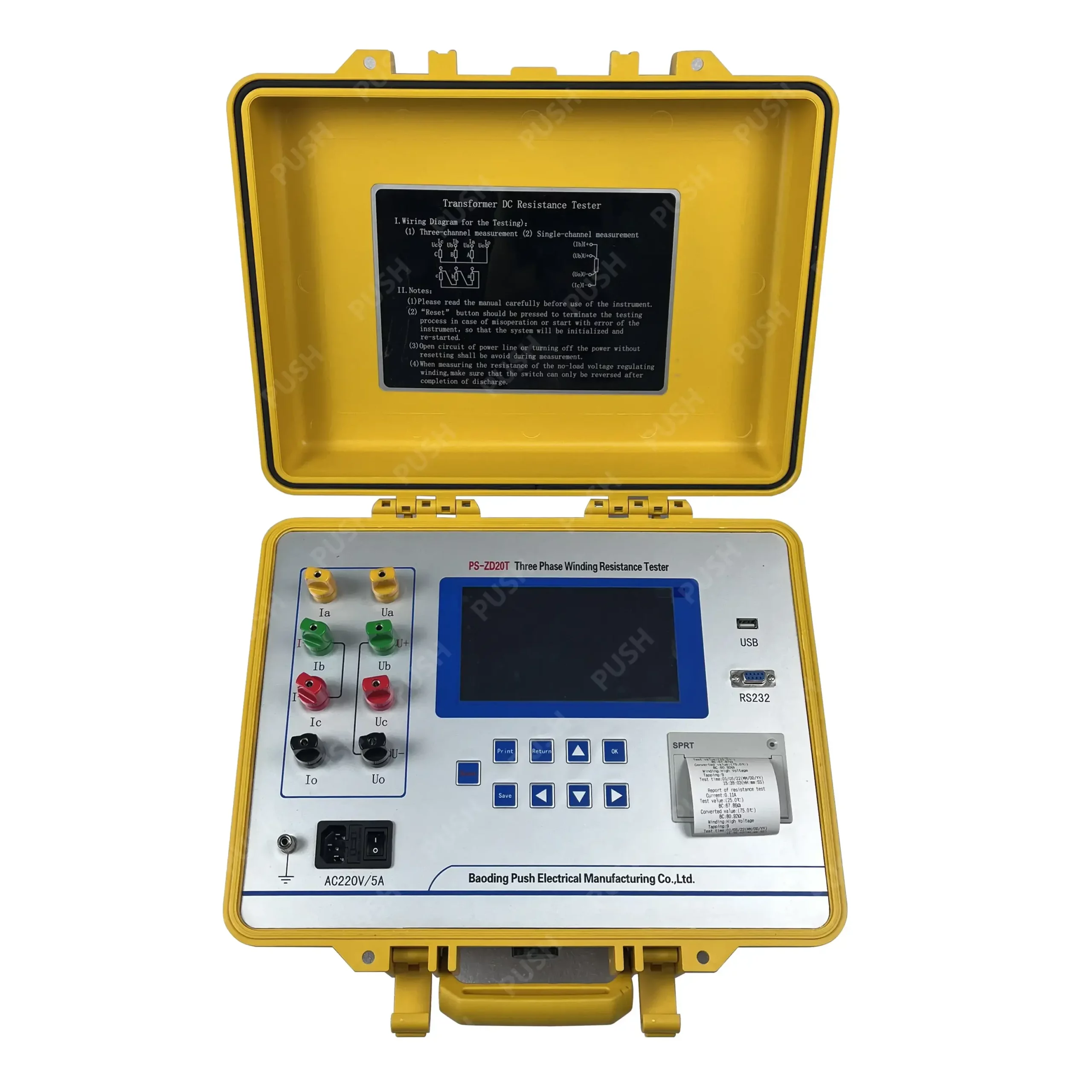Yes, there are different types of earth ground resistance testers available in the market, each designed to suit specific applications and measurement needs. The choice of the right type depends on factors such as the type of ground system, the level of accuracy required, and the environmental conditions.
Here are some common types of earth ground resistance testers:
- Fall-of-Potential Tester: This is one of the most traditional and widely used types of ground resistance testers. It measures ground resistance by driving a current through a ground electrode and measuring the voltage drop using a set of stakes or probes. Fall-of-potential testers are suitable for most general-purpose grounding applications.
- Clamp-On Ground Resistance Tester: These testers measure ground resistance without driving stakes into the ground. They use a clamp to measure the magnetic field created by the flow of current through the grounding system. Clamp-on testers are convenient for testing ground rods or conductors without disconnecting them.
- Wenner Four-Pin Tester: This type of tester uses a four-pin array that is inserted into the ground, and it measures the ground resistance based on the Wenner method. Wenner four-pin testers are known for their accuracy and are suitable for precise measurements in difficult soil conditions.
- Selective Ground Resistance Tester: Selective testers are designed to measure the resistance of individual grounding electrodes or rods. They allow for the assessment of individual electrodes within a ground system.
- Stakeless Ground Resistance Tester: Stakeless testers are convenient for measuring ground resistance without disconnecting or driving stakes into the ground. They use clamps to measure current and voltage at the grounding electrode, offering ease of use and flexibility.
- Soil Resistivity Tester: Soil resistivity testers measure the resistivity of the soil itself, which is essential for designing an effective grounding system. This data is then used to calculate the expected ground resistance based on the layout of the grounding system.
- Digital Multifunction Testers: Some modern ground resistance testers are integrated into digital multimeters or multifunction testers, allowing users to perform a variety of electrical measurements, including ground resistance testing.
- High-Precision Testers: These testers are designed for applications where extremely high precision is required, such as in the telecommunications or power utility industry. They may have advanced features for in-depth analysis and reporting.
The choice of the right type of earth ground resistance tester depends on the specific requirements of the grounding system and the measurement environment. It’s essential to consider factors like accuracy, ease of use, environmental conditions, and the need for specific measurements when selecting a tester. Proper maintenance and calibration of the chosen tester are also important to ensure accurate and reliable measurements.
What are the typical applications and industries where earth ground resistance testers are essential tools?
Earth ground resistance testers are essential tools in various applications and industries where electrical safety, equipment protection, and the integrity of grounding systems are critical.
Some of the typical applications and industries where these testers play a crucial role include:
- Electrical Utilities: Ground resistance testing is essential for electrical utilities, such as power distribution and transmission companies. It ensures the proper grounding of electrical substations, transformers, and transmission towers to protect against electrical faults and lightning strikes.
- Telecommunications: In the telecommunications industry, earth ground resistance testing is essential to maintain the integrity of grounding systems in communication towers, data centers, and network infrastructure to prevent electrical interference and ensure network reliability.
- Industrial Facilities: Ground resistance testing is vital in industrial settings to protect equipment and personnel from electrical faults. It is used in manufacturing plants, refineries, chemical processing facilities, and other industrial sites.
- Commercial Buildings: Ground resistance testing is performed in commercial buildings to ensure the safety of occupants and protect electrical equipment. This includes office buildings, shopping centers, and hospitals.
- Residential Construction: Ground resistance testing is relevant in residential construction to ensure that grounding systems for homes and residential buildings meet safety standards and protect against electrical hazards.
- Construction and Contractors: Electrical contractors and construction professionals use ground resistance testers to verify the quality of grounding systems during the construction and installation of electrical infrastructure.
- Renewable Energy: Ground resistance testing is important in renewable energy projects, including solar and wind farms, to ensure the proper grounding of equipment and electrical systems.
- Oil and Gas Industry: Ground resistance testing is essential in oil and gas facilities to protect against electrical hazards, especially in potentially explosive environments.
- Railroad and Transportation: Ground resistance testing is performed in the transportation sector to ensure the safety and reliability of railway systems, earth ground resistance tester including train tracks, signaling, and communication systems.
- Aerospace and Aviation: Ground resistance testing is used in airports and aerospace facilities to ensure the safety and reliability of electrical systems in aircraft maintenance areas, control towers, and other aviation infrastructure.
- Environmental Monitoring and Research: Ground resistance testing is employed in environmental monitoring systems, such as weather stations and environmental research sites, to protect sensitive instruments and data collection equipment.
- Mining and Heavy Industry: Ground resistance testing is used in mining operations and heavy industrial settings to ensure the safety of personnel and equipment in potentially hazardous environments.
- Data Centers: Data centers and server rooms rely on ground resistance testing to maintain the integrity of grounding systems and protect sensitive electronic equipment.
- Emergency Services: Ground resistance testing is important for emergency services, such as fire departments and emergency medical services, to ensure the safety of personnel and equipment.
- Laboratories: Ground resistance testing is conducted in laboratories to protect sensitive scientific instruments and equipment from electrical interference.
In all these applications and industries, earth ground resistance testers are essential for ensuring electrical safety, preventing equipment damage, and maintaining the reliability of electrical and grounding systems. Regular testing and maintenance of grounding systems help protect against electrical faults, lightning strikes, and other electrical hazards.

Comments